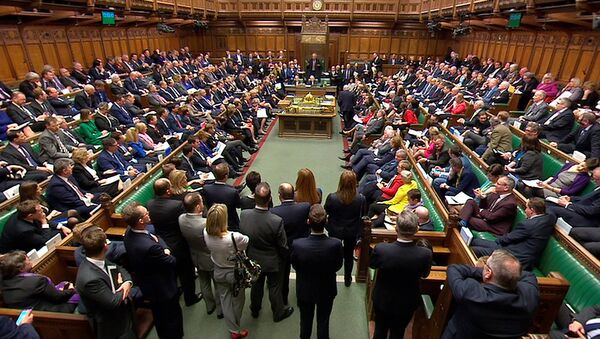Following the March 14 instalment of Prime Minister's Questions, Theresa May outlined her government's official response to the poisoning of Sergei Skripal and his daughter, Yulia, in Salisbury — taking aim squarely at Russia, before the identity and motivation of his attacker has even been identified by investigators.
The list of directives come after May gave Russian officials 24 hours to offer an explanation of the poisoning of the ex-spy — while the Prime Minister claimed no response had been forthcoming, the Russian Embassy's Twitter account in fact bristled with reaction.
In particular, London was asked to hand over samples of the chemical substance that harmed the Skripals, and comply with the Chemical Weapons Convention, which stipulates there must be joint investigation into such indictments — a prospect for which Moscow was said to be "ready."
On Your Marks
In response to May's statement, Labour leader Jeremy Corbyn questioned why samples of a deadly nerve agent had not been dispatched to Russia for analysis. Despite describing the use of the nerve agent on the Skripals as an "appalling act of violence", his pressing of the Prime Minister for what evidence the Government had for blaming the Kremlin for the incident in Salisbury drew jeers from MPs on both sides of the chamber.
12:50 Jeremy Corbyn: "This dreadful appalling act which we totally condemn".
— Matt Thomas (@Trickyjabs) March 14, 2018
13:00 Theresa May: "The right honourable gentleman could have taken the opportunity to condemn"
It only took 10 minutes for Theresa May to frame an outright lie regarding nerve agent attack. #PMQs
"How has she responded to the Russian Government's request for a sample of the agent? Has high-resolution trace analysis been run on a sample of the nerve agent, and has that revealed any evidence as to the location of its production or the identity of its perpetrators? And can the Prime Minister update the House on what conversations, if any, she has had with the Russian Government?" Corbyn implored.
Corbyn shouldn't be sorry for highlighting the political ineptitude of our government's response to this crisis. In times such as these it's more important than ever.
— Matt Turner (@MattTurner4L) March 14, 2018
He also lambasted official cuts to the UK diplomatic service, which he said undermined the UK's influence abroad, stating it was moments such as this Governments realise how "vital" strong diplomacy and political pressure are for security and national interest.
Shades of Iraq
In a briefing to journalists following the session, a spokesperson for Corbyn said the Labour leader's desire for evidence before apportioning culpability to Russia stemmed from the UK's history of weapons of mass destruction intelligence not being accurate, a clear reference to the erroneous, propagandistic claims of Baghdad's chemical weapons capabilities spread by the British government, media and intelligence services, in the leadup to the 2003 US/UK-led invasion of Iraq.
Big development. Corbyn spksman suggests that Corbyn wants evidence before apportionment of culpability to Russia state. Adds UK has " history" of weapons of mass destruction intelligence not being accurate.
— Paul Waugh (@paulwaugh) March 14, 2018
He also suggested the alleged substance used to attack Skripal, 'Novichok', could've ended up in the hands of many state and non-state actors following the breakup of the Soviet Union, and could not be said to be a 'Russian' weapon.
Doubts about Novichok have also been expressed by academics with knowledge of chemical weapons. Professors Paul McKeigue and Piers Robinson of the Working Group on Syria, Media and Propaganda, have noted there are reasons to doubt the compounds comprising Novichok are military grade nerve agents or a Russian 'Novichok' programme even ever existed.
Updated: Russian to Judgement — The same people who assured you that Saddam Hussein had WMD's now assure you Russian "novochok" nerve agents are being wielded by Vladimir Putin to attack people on British soil. As with the Iraqi WMD dossier, it is https://t.co/0beG8eXYLt
— Craig Murray (@CraigMurrayOrg) March 13, 2018
Moreover, they claim synthesis at bench scale of 'Novichoks' is within the capability of any modern chemistry laboratory — Porton Down, the UK government's chemical weapons testing facility in Salisbury, is itself able to synthesize these compounds in order to develop tests for them.
In any event, the history of the alleged Novichok program remains unclear. The original source of the story — that they were developed as chemical weapons in the Soviet Union during the 1970s and 1980s — comes from Russian chemist Vil Mirzayanov, who defected to the US in the 1990s.
READ MORE: US Had Access to Substance Allegedly Used to Poison Skripal Since 1999 – Report
Mirzayanov described the chemical structures of the compounds, stating the toxicity of an agent named Novichok-5 "under optimal conditions exceeds the effectiveness of VX by five to eight times." Mirzayanov alleged Russian testing and production had continued after signing the Chemical Weapons Convention in 1993.
1) former (main) Soviet Novichok facility in Uzbekistan unsecure under Uzbek control since 1990. Criminal groups could have obtained.
— Stephen McIntyre (@ClimateAudit) March 14, 2018
2) US in control of Uzbek facility since 1999: CIA
3) formula public and readily synthesizable at Porton Downs or labs in US, Israel, Ukraine &c
However, a review by Dr Robin Black, coincidentally until recently head of the detection laboratory at Porton Down, emphasized there is no independent confirmation of Mirzayanov's claims about the chemical properties of these compounds. The Organisation for the Prohibition of Chemical Weapons' Scientific Advisory Board also doubted the existence of Novichoks, and did not advise the compounds described by Mirzayanov, or their precursors, should be designated as Scheduled Chemicals that should be controlled under the Chemical Weapons Convention.
Mirzayanov himself claimed alleged Novichok agents were easy to synthesize, stating in 1995 their chemical components can be made at commercial chemical companies "that manufacture such products as fertilizers and pesticides."

